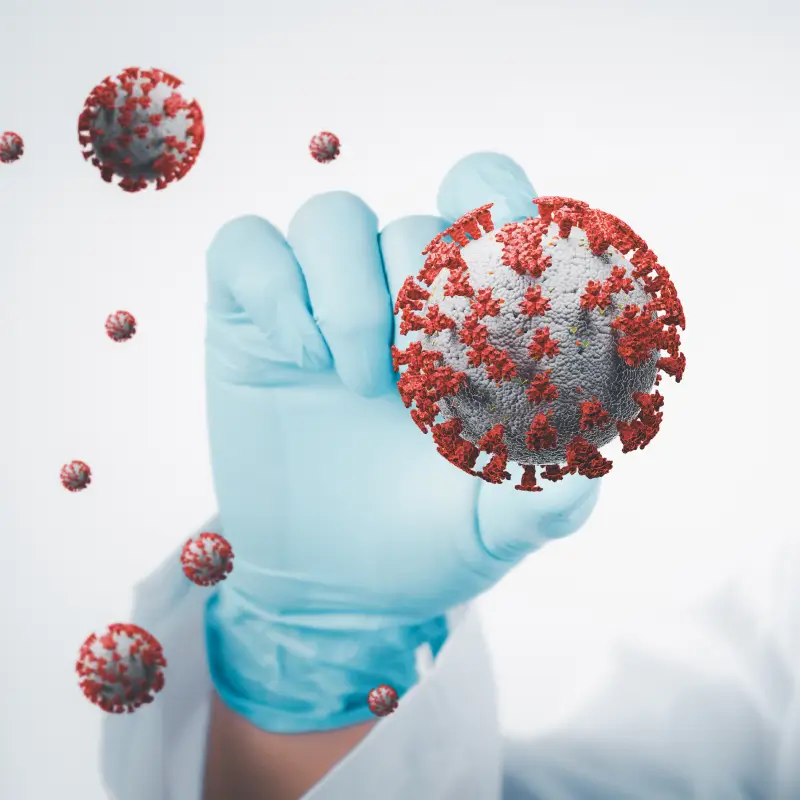Home/Wellness Zone/Sakra Blogs
1st Jan, 2025

Human metapneumovirus (HMPV) is a common virus that often feels like a bad cold, causing symptoms like coughing, wheezing, a runny nose, and a sore throat. While most people recover without issues, certain groups, such as young children, older adults, and those with weakened immune systems, can face more serious health challenges. HMPV spreads easily, and by the time children reach the age of 5, most have already been exposed to it.
Human Metapneumovirus (HMPV) is a virus that primarily affects the lungs and airways. It was first identified in 2001 and is part of the same family as other common viruses like respiratory syncytial virus (RSV) and parainfluenza. Metapneumovirus (HMPV) can cause everything from mild cold-like symptoms to more serious respiratory issues. Understanding this virus, specifically HMPV, is important, especially when it comes to recognizing and managing infections in vulnerable groups, such as young children, the elderly, and those with weakened immune systems.
Human Metapneumovirus (HMPV) is caused by a virus from the Paramyxoviridae family and mainly affects the respiratory system, including the lungs and airways. The virus spreads when someone infected coughs, sneezes, or even talks, releasing droplets into the air. It can also be passed through direct contact with an infected person or by touching surfaces they’ve contaminated. Though the exact source of infection isn’t always clear, HMPV tends to spread more during colder months when respiratory illnesses are more common.
The symptoms of HMPV are similar to those of other respiratory infections. They include:
Symptoms generally appear 3-6 days after exposure and can range from mild to severe.
Certain groups of people are more likely to experience severe illness from HMPV, including:
HMPV is highly contagious and can spread in several ways:
HMPV symptoms are similar to those of other respiratory illnesses, so accurate diagnosis relies on specific laboratory tests:
While most cases resolve on their own, HMPV can cause severe complications in high-risk individuals, including:
There is no specific antiviral treatment for HMPV. Metapneumovirus treatment focuses on relieving symptoms including:
Preventing HMPV involves general hygiene and avoiding exposure:
Seek medical attention if you or your child experience:
Currently, there’s no specific antiviral treatment or vaccine for HMPV. However, supportive care, like pain relief and help with breathing, is important for managing symptoms. To reduce the spread of the virus, practicing good hygiene, washing hands regularly, and avoiding close contact with those who are sick are essential. If you're at high risk, such as young children, the elderly, or those with weakened immune systems, it’s crucial to seek medical attention right away if symptoms become severe. Early care helps prevent complications and ensures better management.
1. Is HMPV the same as the flu?
No, HMPV is different from the flu, though symptoms may overlap. The flu is caused by influenza viruses, while HMPV belongs to the Paramyxoviridae family.
2. Can HMPV be prevented with a vaccine?
Currently, there is no vaccine for HMPV. Preventive measures focus on hygiene and avoiding exposure.
3. How long does an HMPV infection last?
Most infections last 1-2 weeks, but recovery time may be longer in severe cases.
4. Are antibiotics effective against HMPV?
No, antibiotics are ineffective because HMPV is a viral infection, not a bacterial one.
5.Is there any specific treatment available for HMP Virus
No as of now no specific anti-virus medicine for hmp virus only supportive care is recommended
6. How is HMPV different from RSV?
HMPV and RSV are related but distinct viruses. Both can cause similar respiratory illnesses, but HMPV infections are typically less severe.
7. How long does it take to recover from HMPV?
Most people recover from HMPV within 7 to 10 days, though recovery time can vary based on the severity of the infection and the person's general health.
8. Is HMPV Similar to the COVID-19 virus?
HMPV and COVID-19 are both viruses that affect the respiratory system, but they are caused by different viruses. HMPV is part of the Paramyxoviridae family, while COVID-19 is caused by the SARS-CoV-2 virus from the Coronaviridae family. Although they have similar symptoms like fever and cough, HMPV tends to lead to milder illness compared to COVID-19.
Enquire Now
